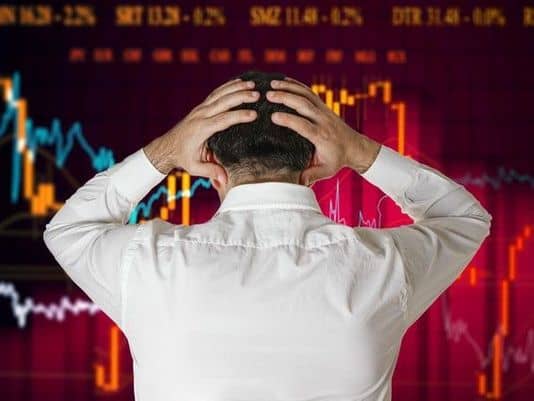
Does the stock market know something the economy doesn’t? The S&P 500 index has plunged 17.5 percent since its Sept. 20 peak. The rout intensified last week, stirring fears of a looming recession despite an economy that, by most measures, seems to be on solid footing. Economics reporter Paul Davidson sorts out the split-screen messages.
What is a recession?
A recession is a decline in economic activity that lasts more than a few months, according to the National Bureau of Economic Research (NBER). Many economists define a recession as a drop in gross domestic product for two straight quarters. But some downturns don’t necessarily fit that mold. Rather, NBER looks at GDP as well as income, employment, industrial production and wholesale and retail sales in deciding when to officially call a recession, typically well after it has begun.
What causes a recession?
A recession typically happens when the economy has peaked and starts to peter out in various ways. For example, so many Americans replace worn-out cars during an economic expansion that most of the demand is sapped and auto sales begin falling. Very low unemployment forces businesses to raise wages, which in turn narrows their profits and leads them to dial back hiring and investment. A run-up in inflation spurs the Federal Reserve to raise interest rates too sharply, discouraging borrowing and economic activity.
Recessions can also be triggered by shocks, such as the bursting of the dot-com bubble in 2001, which doused business investment. The subprime mortgage crisis of the mid-2000s caused millions of Americans to lose their homes and led banks to pull back on lending, setting the stage for the Great Recession of 2007-09.
Is the current market sell-off signaling a recession next year?
A market correction (a drop of 10 percent or more) is often a leading indicator of recession six months or so down the road as investors sniff out a coming slowdown in consumer and business spending that would hurt corporate profits. But by several key measures, the economy is in its best shape in years, posting its strongest six-month stretch since 2015 and poised to reach 3 percent growth this year for the first time since 2005. The 3.7 percent unemployment rate marks a half-century low and heralds faster wage growth for American workers. And retail sales were robust last month. That’s key because consumer spending makes up 70 percent of economic activity.
Are there any weak spots in the economy?
Sure, the housing market has been in the doldrums this year. And business investment slowed in the third quarter while a key measure of business equipment spending fell in two of the last three months. But they represent smaller pillars of the overall economy, and it’s too soon to tell if they’re signaling deeper troubles ahead.
Then why is the market tumbling?
Markets are forward-looking and often reflect fears and risks rather than economic fundamentals. The Federal Reserve has been steadily raising interest rates and signaling further hikes ahead. That’s making lower-risk bonds more appealing than stocks for many investors and triggering worries that the rate hikes will slow the economy. The Fed raised its key rate again last week, and although Fed officials lowered their forecast from three hikes next year to two, investors wanted the policymakers to take more of a wait-and-see approach to future rate increases.
That’s because they see storm clouds gathering next year: The fading effects of federal tax cuts and spending increases; a slowing global economy that could be worsened by the U.S. trade war with China; and the cumulative effect of the nine Fed rate hikes since late 2015.
So is the market right?
Probably not. Like many economists, Gregory Daco of Oxford Economics says investors are overreacting. Sure, the economy will slow next year, but a recession is highly unlikely, most economists say, though many are predicting a downturn in 2020. Economists surveyed by Wolters Kluwer Blue Chip Economic Indicators expect the economy to grow a solid 2.6 percent in 2019 based on their average estimate. That’s not even close to the decline in economic output that would spell recession.
“This correction is pricing in a recession that we do not think will occur,” Wells Fargo Investment Institute wrote in a research note Friday. “We view the sell-off as overdone.”
Can the market sell-off itself cause a recession?
Yes, and economist say that’s the bigger risk – that the correction could make a recession a self-fulfilling prophecy by damaging consumer and business confidence. That will become a more tangible risk if stocks fall another 5 percent or the rout extends another month or two, says Joseph LaVorgna, chief economist for the Americas for research firm Natixis.
“Do you think that would make companies upbeat about hiring people?” LaVorgna asks.
Can this negative dynamic be changed?
Yes. A U.S. trade deal with China would be a positive catalyst for both the economy and markets. Resolving the government shutdown that began over the weekend couldn’t hurt. And if the market keeps diving, LaVorgna expects the Fed to signal that it’s further scaling back its rate-hike plans as soon as its late January meeting. That, no doubt, would make markets very happy.
























